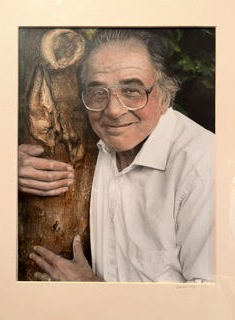Arthur Robbins, cofounder of Pratt’s art therapy program and a professor emeritus of creative arts therapy, passed away on May 7, 2022.
Robbins came to Pratt in the fall of 1971, serving as field coordinator for the nascent art therapy program. He taught full time until his retirement in 2008, and then returned to teach part time from 2010 through 2016. From fall 1982 to fall 1984, he also served as chair of the graduate art therapy program.
Robbins is remembered as a forceful and highly creative leader, author of several books and numerous articles. As a licensed psychologist and certified psychoanalyst, he was also the founder of the Institute of Expressive Analysis.
Robert Wolf, BID ’68; MPS Art Therapy and Creativity Development ’73, shared this remembrance:
“Art was my teacher at Pratt when I went through the program in 1971, and later a colleague when we both taught at the Pratt New Hampshire summer institute [now referred to as the Creative Arts Therapy Low Residency Program], where we both created art together during the 1980s; he made welded metal art and I worked on stone carving, often stopping to critique each other’s work. After that, he asked me to replace him as president of the Institute for Expressive Analysis when he decided to retire in the mid ’90s. He became a dear friend during the many years since. As artists and clinicians, we shared a unique view of the world and often enjoyed long talks on the state of the world and other issues. He was always available as a source of wisdom and grounding.”
Former creative arts therapy faculty member Claudia Bader, MPS Art Therapy and Creativity Development ’77, wrote a tribute to her teacher and colleague, excerpted here:
“I have known Art Robbins since 1973, when I started Pratt Institute’s graduate Art Therapy and Creativity Development program. . . . In 1978, he started the Institute for Expressive Analysis (IEA), from which I graduated and became director of education and then executive director of the Institute. I was the first IEA graduate to become executive director. I had been in a countertransference-oriented supervision group with him since the mid-’90s. He is the biggest single influence on my psychotherapeutic work.
“A great empowerer of women, Art was a champion of people’s individuality and creativity. He continued to evolve himself, always learning and integrating new knowledge in his own creative way. I certainly benefited from this.
“Significantly, in a discussion with him in 1974, I ‘came out’ to him as an astrologer. He was curious, not condemning, and asked me if I knew what sign he was. I am not someone who can guess people’s sun signs. I can identify planets that are strong in people’s charts; however, I stopped, breathed, and then took note of what images came to mind with him. Dark, penetrating . . . I said, I think you are a Scorpio, a sign known for its dark and penetrating energy. I was right. We were both impressed.
“His openness and acceptance validated me and that supported my years of integrating astrology, creative arts, and depth psychotherapies. I remember well how in 1995, before the first day I taught art diagnosis, never having taught in a university before, having created the class in six weeks, majorly anxious, that he processed with me what my fears were about teaching. As many know, I went on to successfully teach art diagnosis, creating a technique of my own for moving into artwork at Pratt (and then in addition the New School and the School of Visual Arts) until 2021, when I decided to retire from teaching in graduate programs.
“Thank you, Art, for it all.”
Former faculty member Briana MacWilliam, MPS Art Therapy and Creativity Development ’06, also offered this remembrance:
“When I was a student at Pratt, we were talking about the role of projection, and how to use our own projections and countertransference to become increasingly aware about the unconscious dialogue that exists in the transitional space with a client. Art asked a dance therapy student, ‘What kind of dance do you think I would dance?’ She replied, ‘A waltz.’ I thought to myself, ‘Oh no, definitely a Lindy Hopper.’ Sixteen years later, and three weeks ago, I shared that story with Art in supervision. He chuckled (without confirming my assumptions) and asked, ‘What kind of dance would you dance with me now?’ I got tearful and said, ‘A waltz.’ He said, ‘Huh. So I’ve evolved.’ It’s been a pleasure and a blessing to witness such an evolution.”
Funeral services took place on May 11, 2022, at Plaza Jewish Chapel in New York City. Condolences can be expressed through the memorial web page.
The Creative Arts Therapy Department has made a donation to plant trees in memoriam.
